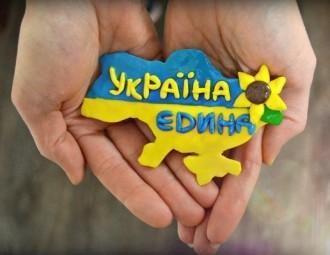Andrei Yahorau: There is no division into eastern and western Ukraine

However, south-eastern regions can be separated from Ukraine despite the will and wishes of Ukrainians.
The myth about the existence of two Ukraines: about the existence of two different cultural and political communities at the territory of a Ukrainian state appeared 20 years ago, after the disintegration of the Soviet Union, when an independent Ukraine appeared on the world map. This myth turned out to be very durable and is especially popular over the last time, making it very easy to explain today’s situation in the neighboring state.
According to it, one of the two Ukraine’s is pro-European and shares liberal-democratic values, wants to join the EU and, what is more important, speaks Ukrainian. Lviv is a symbolic centre of this Ukraine. The other Ukraine feels nostalgic for the USSR, has close connections with the modern Russia, is hostile to the West and doesn’t share European values. The language of the other Ukraine with the “capital” in Donetsk is Russian. If we take this theory for granted, it’ll mean that the area of habitation and the language people are speaking automatically equals their political views.
In order to find out whether the antagonism of the eastern and western Ukraine has real basis, Bertelsmann Foundation and Institute of Public Affairs in Warsaw prepared a research, and EuroBelarus Information Service together with the Centre for European Transformation translated it into Russian.
But what were the results of the research “Language, Identity, Politics - the Myth of Two Ukraines”? Why two different Ukraines is an invention and how the opponents of Ukraine’s unity use it? Why this research was interesting for the Belarusan analysts? Andrei Yahorau, the head of the Centre for European Transformation, answered these questions in the talk with the EuroBelarus Information Service.
- We have been supporting partner relations with the Bertelsmann Foundation, which performs different kind of research, for quite a long time. The foundation also makes an annual Bertelsmann Transformation Index (BTI), which assesses the level of development in the countries which undergo transformations.
The research about the myth of two Ukraines seems topical for us as we lack objective data to give realistic assessment of the situation. There is a lot of speculation and simplified interpretations, which are disintegrated in this research.
- Which conclusion is drawn by the researchers? Is Ukraine really divided into two conventional parts on the basis of language and nationality? Is it correct to say that there is a pro-European part of Ukraine, where the level of national self-identity is very high, and pro-Russian part, where the vast majority of population speaks Russian?
- The conclusion of the research is in its name: “Language, Identity, Politics - the Myth of Two Ukraines”; i.e., there is no real division into the West and East in Ukraine. The myth of two different Ukraines appeared in the beginning of 90s, when first attempts to interpret the situation of independent Ukraine were made.
Later the inventor of the theory himself rejected such simplified assessment of situation in Ukraine; however, the myth turned out to be very durable and now is used by different political players. We heard the latest variation on the subject after the protests, which burst out due to the suspension of signing of the EU Association Agreement.
- But why did this myth turn to be so durable? If it still lives, it means that somebody needs it.
- On the whole, people are trying to interpret and explain the world around them with simple patterns. And by existence of eastern and western Ukraine it is very easy to explain the events which are now happening in Ukraine. This myth is rooted in the mass conscience, and the majority of Ukrainians really believes in the existence of two Ukraines.
- If there is no eastern and western Ukraines how can we explain today’s conflicts in the country?
- Today’s events in Ukraine are inspired and supported from without. It is Russia that is the source of destabilization in the south-eastern Ukraine, which assumingly made some different civilized choice. It is Kremlin that stirs up minor confrontation that exists in this region with the help of its propaganda and with direct support of separatist moods by delivering arms and funding gangster groups.
As the research shows, without the support from without, separatist moods are very weak.
Perhaps, there is only one question that enables us to see the difference between the moods in western and eastern Ukraine – the choice between EU integration and Customs Union. However, in this case regional contradictions are explained by objective reasons: the closeness of central and western parts to Europe, and the closeness of south-eastern part of the country to Russia. But even in this case Ukrainians don’t support federalization and split of the country – the vast majority of Ukrainians stand for single and unified Ukraine.
- What can be the consequences if the myth comes to life?
- The most tragic variant is the forceful division of Ukraine, which would result in an armed confrontation and death of the civilian population. We see that Russia is supporting separatist groups, leading the country to disintegration and trying to cash in on the mythology of two Ukraines.
- Are the separatists capable of dividing Ukraine with the help of Russia?
- They are, as the situation in Crimea demonstrated, where only 23 per cent of Crimean citizens supported annexation of Crimea to Russia. Popular will didn’t prevented Russia from annexing Crimea.
South-eastern regions can be separated from Ukraine despite the will and wishes of most Ukrainians. This is promoted with the Russia’s support of separatist moods as well as with the unclear position of the Ukrainian oligarchy and the weakness of the current Ukrainian government, which can’t effectively confront the fomentation of separatism inspired from without.
-
03.01
-
07.10
-
22.09
-
17.08
-
12.08
-
30.09










































